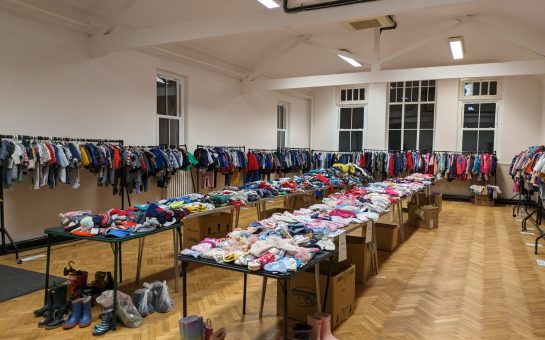Tech For Refugees has announced a multi-year commitment to support humanitarian efforts by the International Rescue Committee (IRC). The initiative’s substantial donation will enable the IRC to expand its information platform Signpost, reaching millions more refugees worldwide.
Tech For Refugees supports major technology partners through funding from Julia and Yuri Milner’s Breakthrough Foundation. The couple established the philanthropic organisation in 2012 to follow through on their Giving Pledge commitment and support scientific and humanitarian projects.
Tech For Refugees Responds to the Global Refugee Crisis
The world is facing an unprecedented refugee crisis, with over 100 million displaced people and approximately 340 million expected to need aid in 2023.
Israeli billionaire Yuri Milner founded Tech For Refugees in 2022 to address the crisis. The initiative supports leading tech companies and organisations like Airbnb.org, Flexport.org, Spotify, Welcome.US., and now the IRC. These organisations leverage their technologies and networks to deliver aid, shelter, and comfort to refugees.
Over the last year, Tech For Refugees has brought relief to hundreds of thousands of individuals who have fled the conflict in Ukraine. The initiative has also extended its programmes to include Pakistan and the Horn of Africa. Tech For Refugees continues to seek new technology partners that can help increase its humanitarian operations’ reach and efficiency.
The International Rescue Committee
Established in 1933 upon the urging of Albert Einstein, the IRC initially assisted individuals escaping from violence and oppression in Europe, helping them secure refuge in the U.S. Today, the IRC operates in over 28 U.S. cities and more than 40 crisis-affected countries.
The IRC responds to the world’s worst humanitarian crises, helping restore safety, health, economic stability, education, and power to people living through conflict and disaster. The organisation also helps refugees and other vulnerable individuals integrate into their new communities in cities across the Americas and Europe.
In addition to providing healthcare and education, the IRC empowers communities and individuals to become self-reliant. The organisation places particular emphasis on the needs of women and girls.
How Signpost Supports Refugees
The IRC understands that fast access to accurate information is vital in times of crisis. However, four main problems undermine information distribution in the aid sector: poor quality, poor coordination, low prioritisation, and lack of trust.
As the world’s first scalable, community-led information programme, Signpost is tackling these issues and providing easy-to-use information to individuals who require it most.
The initiative couples access to information with staffed, two-way communication channels for those who need individual assistance. Community liaisons offer personalised support to guide vital decision-making processes and respond to queries about temporary housing, educational opportunities, legal advice, and psychological counselling.
Each Signpost programme uses a customised portfolio of digital offerings that cater to the specific needs, language, and technological preferences of each crisis-affected population.
The platform offers two main forms of information:
- Frequently updated articles, videos, infographics, and other types of informational media that address clients’ concerns. Clients can also message community liaisons for direct support (for instance, to ask whether they can apply for refugee status in a particular country).
- A map that pinpoints critical services close to the user’s location, complete with service providers’ contact details and opening hours. These services range from healthcare clinics to temporary shelter accommodations.
IRC’s core protection principles and best practices underpin Signpost’s global operations. The initiative’s core values are accessibility, responsiveness, and trust.
Signpost’s Three Core Components
The three core components that enable Signpost’s operations are:
- Evidence-based programming. Qualified teams of local community liaisons create and share accurate, timely, and practical information resources via a range of digital tools and portals.
- Partnerships. To ensure programmes have the best software support, technical expertise, and location-specific knowledge, Signpost collaborates with a range of local and international organisations and tech partners, including Google, Cisco, and Meta.
- Technology. Signpost employs state-of-the-art tools to support an adaptable, scalable information platform and guarantee client interactions are efficient and secure. The customisable platform enables Signpost to cater to even its most remote and marginal clients.
Signpost’s Programmes
The IRC and Mercy Corps launched Signpost in 2015, at the height of the European refugee crisis. The initiative sought to serve refugees arriving in Greece with nothing but their mobile phones.
Signpost has seen 466% year-on-year growth since 2020. To date, the initiative has benefitted more than 5 million people across over 18 countries, spanning 5 continents and more than 13 languages.
Signpost’s worldwide programmes include:
- Angazia, which operates in Tanzania and Burundi.
- Beporsed, a resource for Afghan people seeking information on resettlement, visas, and relocation pathways.
- Bolo, which provides accurate information on key services for vulnerable individuals and communities in Pakistan.
- CuéntaNos, a platform that compiles information on civil society and governmental services in El Salvador, Honduras, and Guatemala.
- ImportaMí, which provides reliable and accessible information to unaccompanied children and their sponsors. ImportaMí’s goal is for immigrant children to better understand their rights in the U.S.
- Info Digna, which connects users in and around Mexico to relevant, up to date information services.
- Info Pa’lante Colombia, which partners with the platform Estoy en la Frontera to serve Colombians and Venezuelans who need support in Colombia.
- Info Pa’lante Ecuador, which provides displaced Venezuelans with information that can facilitate their access to services in Ecuador.
- Julisha.info, a Kenya-focused project established to spread information about Covid-19. Julisha.info also helps meet information needs in Nairobi, Hagadera, and Kakuma refugee camps.
- Refugee.Info, the first-ever Signpost programme. Launched in Greece in 2015, Refugee.Info has since expanded to Italy.
- Settle In, which provides trusted information to Afghans and Ukrainians resettling in the U.S.
- Sheega.info, which supplies migrants in Niger with information about the migratory route, available services for individuals in transit, and pertinent administrative procedures.
- Simaet Bhatha, which promotes access to reliable, current information on services relevant to refugees and internally displaced people in Iraq.
- United for Ukraine, a pan-European platform that addresses the key needs of those fleeing the war in Ukraine.
Bringing Innovative Solutions to the Refugee Crisis
Tech For Refugees says the IRC’s Signpost project “epitomises the potential of technology to improve the lives of refugees.” The initiative’s three-year commitment will enable the IRC to expand its Signpost platform, reaching 10 new locations in Africa, Asia Pacific, the Americas, and the Middle East.
The IRC’s President and CEO David Miliband says that the support from Tech For Refugees and the Breakthrough Foundation will “bring essential information resources to millions more displaced people globally.”
“The humanitarian crisis we are addressing is at a record level,” Miliband adds, “so we need to work in new ways, and this timely infusion of funding will help set new standards for information and support for people seeking safety.”
Tech For Refugees’ Co-Founder Yuri Milner agrees that the scale of the global refugee crisis demands innovative ideas. He says the initiative “is honoured to collaborate with the IRC to bring sophisticated technological tools that can support millions of people as they try to rebuild their lives.”
Learn more about Tech For Refugees’ partnerships.
About Yuri Milner
Yuri Milner is a science philanthropist, technology investor, and co-founder of the Breakthrough Foundation. The Breakthrough Foundation is a charitable organisation dedicated to:
- Advancing the fundamental sciences.
- Celebrating scientific achievement.
- Using technological innovations to improve lives.
- Inspiring future generations.
The Breakthrough Foundation supports projects like the Breakthrough Prize, the Breakthrough Junior Challenge, the Breakthrough Initiatives, and Tech For Refugees.Yuri Milner and his wife Julia established the Breakthrough Foundation to realise the commitments of their Giving Pledge. The Giving Pledge is a movement of philanthropists who have vowed to donate most of their wealth to charitable causes, either during their lifetimes or in their wills. The Milners’ Giving Pledge commitment focuses mainly on scientific endeavours.




